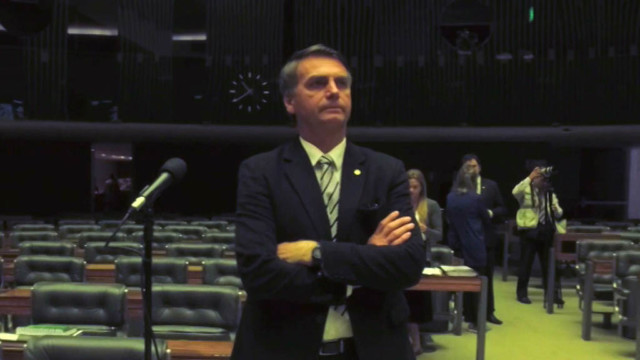Brazil’s deepening corruption scandal has led to charges against dozens of politicians.
They are accused of receiving bribes in return for handing out lucrative government contracts.
The scandal has consequences for the 2018 Presidential election as people consider not voting for traditional politicians.
CGTN’s Stephen Gibbs met one politician who plans to benefit from the controversy.
Jair Bolsonaro’s, the controversial congressman, confirmed that he is putting his name forward for the 2018 election.
“Although I am well aware of the Brazilian political game, I want to present myself as an alternative, similar to the type of conservatism which is appearing in both the United states and France,” Bolsonaro said.
Long seen as an outsider, owing to his right-wing, nationalist views, Bolsonaro’s star is rising.
That is partly because almost the entire traditional political class has been caught up in the biggest corruption scandal in Brazil’s history.
A third of the congress has been implicated in the so-called ‘car wash’ kick-back scheme, involving billions of dollars.
Two possible presidential candidates in 2018, former President Luiz Inacio Lula da Silva, and Senator Aecio Neves both have legal cases pending against them.
That may open up the field to an outsider.
“Logically what is happening now will work in my favor as all the political leaders here have been implicated in the car wash scandal, and we have evidence that I have not participated in this type of politics; or been driven by corrupt money,” Bolsonaro said.
The former army captain supports private gun ownership and labels his left-wing opponents as dishonest.
The congressman is also openly nostalgic about Brazil’s period of military rule, which he says was a time of commendable order and discipline.
During impeachment procedures last year against President Dilma Rousseff he prompted outrage by casting his vote in honor of the colonel who presided over her torture in the 1970s.
His critics said he is a maverick, too controversial to be elected president.
He points to the rapturous applause he is receiving as he travels the country building support for his campaign.
Could that end with a far-right president in Brasilia?
With politics shifting here, like elsewhere in the world, what once seemed inconceivable, now is possible.
 CGTN America
CGTN America

